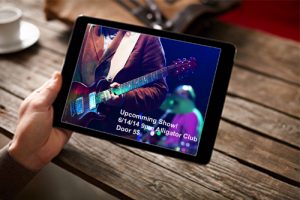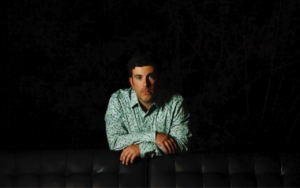 Why you may’ve gotten passed up for that gig
Why you may’ve gotten passed up for that gig
A few weeks ago at the International Folk Alliance Conference, I spoke on a panel called “Keeping Up with Digital Technologies” with Courtney Gallagher, Membership and Marketing Coordinator for Club Passim.
Passim is one of the coolest listener-friendly venues in the Boston area (it’s in Cambridge), so Courtney provided the live music/event promotion/talent-buyer perspective for our discussion.
She said (and we all agreed) that it’s crucial, despite the new tools and services and apps and widgets and plugins available today, that musicians make use of a now relatively old technology: a website.
Not a Facebook Page. Not a Bandcamp page. Not a ReverbNation page. Not an artist page on CDBaby.com.
A REAL website that YOU control— a place to showcase all the audio, pictures, videos, tour dates, biographical details, and contact info that talent buyers, fans, and the press may need when they’re considering promoting your show, writing about your music, or simply deciding whether they like your band.
“It’s important for artists to have a website dedicated specifically to them,” says Courtney Gallagher. “Personally, I promote an average of more than one show a day for our venue, so if I am sending out a newsletter to 25,000 people and I want to feature your act by including a video and you don’t have a website that makes it easy for me, I am going to have to move on to the next artist.”
If you don’t have your own website, you’re not just losing out on promotional opportunities though. You might actually be losing out on gigs too. I asked Matt Smith, Club Passim’s Managing Director, if he would book a band that only had a page on Facebook, Bandcamp, or ReverbNation.
“Of all of those pages, I’d only be likely to give an actual booking to someone with a Facebook page,” says Smith. “Bandcamp only has music (a great thing, but not useful for show dates, etc.), and a ReverbNation page always just feels like a refuge for bar bands. It’s more of a page to house a press kit than for fans. Artists need a centralized location for info for their fans/clubs/etc. to get the word out about shows.”
Keep in mind, these sentiments aren’t unique to the people that run Passim. I’ve heard similar things said by talent buyers at venues all over the country — from small listening rooms to big clubs that cater to every genre. The moral of the story ain’t no mystery: you need a website if you’re going to try to perform live, get press, and build your fanbase.
So how DO you “make it easy” for booking agents, journalists, bloggers, and fans?
Here is a list of things every musician website should have:
1. An updated About page with multiple versions of your bio — You should have a tweet sized description of your music and band, a slightly longer version (about a paragraph), and then the full-blown biography with a list of all your notable accomplishments. You’ll find that promoters and the press will occasionally lift phrases from your bio verbatim, so having a few bio options makes it easy for people to quickly get the info they need.
You don’t have to rewrite your bio from scratch every year. Just be sure to add a few sentences about what’s happening now. (If what’s happening now is also the most important or dramatic news about your band, be sure to put that info at the beginning of your bio).
2. A press page with hi-res photos, press quotes, and your latest press release — This is the bare minimum, assuming all the other stuff a writer would need to cover your music (contact info, videos, music, etc.) can easily be found on your website. Which brings us to…
3. A music player — You’ve GOT to have music available to stream on your homepage (and preferably across multiple pages). A second best option is to put a music player widget in the sidebar of every section/page of your website. Turn the auto-play function OFF as a courtesy to visitors who’ve left their computer speakers on loud.
And a music player that doubles as a music store? Better still!
4. Videos, videos, videos — Fans love ’em. Talent buyers want to know what you sound like (and look like) when you’re performing live. And the press might want to share them when they write about your music. So make sure you’ve got videos on your site that are easily shareable (as in YouTube or Vimeo).
5. Links to the social platforms you’re active on — No need to link EVERYWHERE, but promoters and press all have their preferences when they publicize your event or music release. A blogger might want to link readers to your YouTube channel. A promoter might want to send people to your Facebook page. So you want to have links to the basics: YouTube, Facebook, Instagram, and Twitter. (You should also have some music on Spotify, because lots of blogs that might write about your music like to use Spotify players in their posts,… but that’s a whole other article).
6. Contact info or super simple contact form — Industry folks might need to get a hold of you ASAP. So be sure your contact info is the email account you check most often.
7. A concert calendar — What’s your gigging experience? Where have you played before, and how often? Where and when are you playing next? These details can be super helpful to talent buyers (and to fans who want to come to the shows), so keep your calendar up-to-date.
8. A news section or blog — What’s happening in your musical life? Again, this info is helpful for industry folks AND fans.
9. A music store or links to trusted music retailers — Promoters and booking agents probably won’t be buying your CDs or downloads, but a music store on your website shows you’re serious about your music career. Besides, don’t you want your fans to be able to buy your music?
10. Email capture tool — This probably won’t be used by industry people either, but it shows you’re taking the right steps to interact with your audience — and again, don’t you want to build your email list?
——
If you write about music, book shows, or promote music events, let us know: what do you look for in an artist website? What makes your job easier? Please comment below.
Are you trying to kick-start your music career without a website? Try HostBaby FREE for 30 days!
[hana-code-insert name=’marketing-your-music’ /]
[Notation drawing from Shutterstock.]
